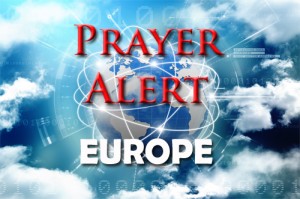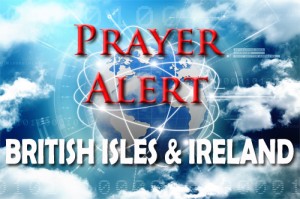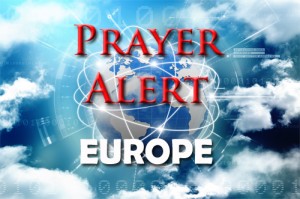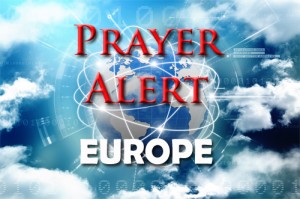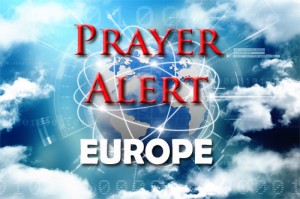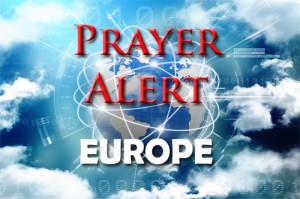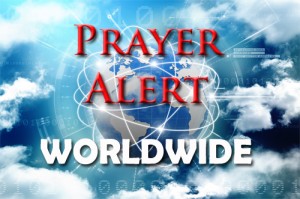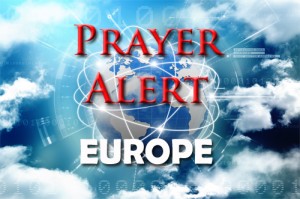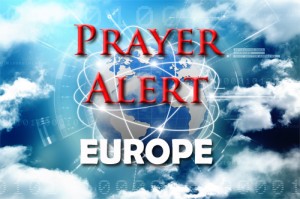Displaying items by tag: Europe
Albania: prayer needs
In this Islamic country, only 0.4% of Albanians are evangelical Christians; 14.3% live below the poverty line, and there are over 8,000 refugees. We can praise God for the relatively good sense of unity and peace among people of different religious faiths, and the Church continues to grow. Many claim that concentrated intercession is responsible for Albania’s openness to ministry. May a prayer movement be raised up within the country, to pray for all the region. Pray that unsaved members of Christians’ families will come to repentance and faith in Jesus Christ. There are three complete translations of the Bible in Albanian: one literal, one paraphrased, and one Catholic. Pray for widespread use of the Scriptures.
Proposals for new deal with the EU
In a statement to MPs, Theresa May called for a ‘unique and ambitious economic partnership’ with the EU after Brexit. ‘Progress will not always be smooth’, she said, but the UK can ‘prove the doomsayers wrong’. Following her speech in Florence, when she gave assurances on payments to the EU and citizens' rights, she said the ball is now in the EU court. Her statement came as the fifth round of negotiations began in Brussels, the final set of talks before EU leaders meet on 19 October to decide if enough progress has been made to enable them to move forward and talk about post-Brexit trade relations with the UK. Two white papers, covering future trade and customs options, are being published (see next article). Justice minister Dominic Raab said that while the UK had to ‘strive for the very best Brexit outcome’, it must also ‘prepare for all eventualities’. ‘No-deal Brexit planning is under way'.
Balkan nationalists take hope from Catalan referendum
Catalonia's drive to separate from Spain is rekindling dreams of independence in ethnic pockets across the Balkans - a dangerous ambition in a region where nationalist violence claimed tens of thousands of lives in the 1990s. Among ethnic Albanians in southern Serbia and the Serbs of Republika Srpska, in the wake of the ‘banned’ Catalan referendum, separatist leaders are asking the same question: ‘Why don't we do the same?’ On the election day, graffiti of Catalan flags appeared several towns in the Serbian province of Vojvodina, along with the claim that ‘Vojvodina = Catalonia’. Meanwhile, in the southern Bosnian town of Mostar, a giant banner appeared near the cathedral showing the flags of Catalonia and Herceg-Bosna, the self-styled Croat entity, reading ‘Good luck. We are the next.’ Local media are saying, ‘The fact that one region (Kosovo) managed to secure independence has emboldened many like-minded leaders in the region’.
Russia: peaceful protesters detained on Putin’s birthday
Over 250 supporters of opposition leader Aleksei Navalny were arrested as they held peaceful protests in eighty cities across Russia on Putin’s birthday. They were demanding that Mr Navalny be allowed to stand in the March 2018 presidential elections. He is currently jailed for organising public meetings, and the authorities say he cannot stand in the elections because of a suspended sentence. Amnesty International said, ‘The Russian authorities must immediately and unconditionally release scores of peaceful protesters detained, and investigate allegations that the police used abusive force. The Kremlin’s intent is to choke the life out of the protest movement, but it has also become clear that this reproachful goal cannot be achieved. Peaceful protest is a right, and many people in Russia want to exercise that right.’ See:
Spain: Catalan referendum
Catalonia has its own history, language and culture. It has both ‘nationality’ status and autonomy within the Spanish constitution. It also has a history of nationalist politics. On 1 October there was a referendum on Catalan independence that the Spanish government declared unlawful. Catalan volunteers guarded polling stations, not from criminals, but from the police. Social media images depict Spanish police kicking non-violent protesters, throwing them down stairs, breaking into buildings, and holding back Catalan police who were trying to help voters - police in a stand-off against each other! The Spanish police managed to force the closure of 93 of 2,000 polling stations. In Spain’s Basque country, other independence-minded people are watching closely. ETA (a Basque terrorist group) has been respecting a ceasefire for many years. Some are wondering what it will do now. Spain is a member state of the Council of Europe, whose primary role is to promote democracy throughout the continent. See
Iceland wants to eliminate Down’s syndrome
The only Baptist pastor in Rekjavik doesn’t want Down's syndrome eliminated. ‘My family has spent a lot of time at the hospital. For over a year our five-year-old son has been undergoing chemotherapy for leukaemia. Our youngest son, born this April, also spent two months at the hospital as doctors ran tests on him, finding a genetic mutation in his X chromosome that only two other people in the world have been diagnosed with. Every day, as I walked into the intensive care unit at the hospital, I looked over a wall of pictures of young children and teenagers holding up photos of themselves as premature babies. They were born after as little as 21 or 22 weeks of pregnancy.’ Meanwhile, there is talk of new legislation which would make abortion available in the 22nd week of pregnancy. Recently this issue took the internet by storm, with a report on how the country (population 340,000) is on the verge of eliminating Down’s syndrome.
India’s prime minister and human rights
On 6 October, Donald Tusk, president of the European Council, and Jean-Claude Juncker, president of the European Commission, will meet India's prime minister Narendra Modi in New Delhi. Alliance Defending Freedom (ADF) International, a human rights group, urges the EU leaders not to 'turn a blind eye' to the rising persecution of Christians and Muslims in India. 'How many more victims of government-condoned violence against Muslims and Christians will the EU tolerate before it puts the issue on the agenda with Prime Minister Modi?’ No person should live in fear of being killed, tortured, or oppressed because of their religious beliefs. The persecution of religious minorities in India has become worse under the government of the BJP, which is the political arm of the nationalist Hindutva movement. The party has been accused of inciting hatred and riots against religious minorities, including Christians and Muslims.
Germany - CALL OF THE WATCHMEN
Send forth Your light and Your truth!
How often have we proclaimed this word of the Lord over our land – and that God has answered! At the German Prayer Conference in Berlin, from September 1 to 3 , weexperienced the revelation of God’s light and truth in aspecial way! This helped us to recognise the influence of thespirit of the age on our thinking and to be released from it.
True repentance begins with a change in our thoughts(“metanoia” in Greek). The word of God is our guide andhelp: “We demolish arguments and every pretension thatsets itself up against the knowledge of God, and we takecaptive every thought to make it obedient to Christ.”(2 Corinthians 10:5).
Pray: Let us continue to pray in faith for our land: “Send forth your light and your truth, let them guideme, let them bring me to your holy mountain, to the place where you dwell.” (Psalm 43:3). -RS
Universities and centres of further education
In the coming months after the prayer conference we wantto concentrate on how we can make a change in our way ofthinking in our society. The Holy Spirit wants to bring abouttransformation in our society and culture. God wants topermeate our education system to break the power ofungodly ideologies and thought structures. Our thinking isalways subject to the influence of the “spirit of the age”.
Knowledge is never neutral and unbiased, but formedaccording to prevailing and generally accepted beliefs.Nowhere are the thoughts and actions within eachgeneration so strongly moulded and influenced as withinour universities and other centres of further education.
Many of the 2.8 million students today will one day be ourleaders and will in many ways influence all areas of sociallife: justice, business, philosophy, education, theology,literature and politics. For too long the thinking of the ’68movement has been influencing all of these areas. The Spiritof God wants to permeate the centres of thoughtformationin our land once again. In past centuries God has inspiredmany in our universities to take his kingdom into the world.
God is the source of ideas and solutions to all questions inlife. He has all the help and answers that our land sourgently needs. But we also need creative thinkers with aservant’s heart who together with the Holy Spirit candevelop innovative ideas and influence thought withinGermany for the good of our land. God is the one who givespeople the gifts, talents and grace to be a blessing to theworld. Germany has often been known as the “land of poetsand thinkers” and is very open to new ways and ideas.
May the Holy Spirit come into our universities and centresof education to renew our way of thinking and bring forthnew life in our land.
Pray:For a transformation in the ways of thinking in oursociety in a move to draw us closer to God.(2 Corinthians 10:4-5)
Pray: For a movement of the Holy Spirit in our universitiesand other centres of thought formation. (Acts 4:29-31)
Pray: That creative thinkers will be inspired by the Holy Spiritto find answers and solutions for the needs of our land.(Daniel 1:7,20; Proverbs 3:5-6)-AS
Formation of a new federal government
The German Federal Parliament was elected four years agoon September 22 , 2013, but the election of the federalchancellor did not take place until December 19 , 2013.There is no deadline for this election in the Germanconstitution. Protracted considerations as to which partiesshould form a coalition and the difficulties in thenegotiations towards a coalition agreement delayed theformation of a new government. This can definitely happenagain if one believes the opinion polls. As this prayer letterwas being written, the result of the new elections onSeptember 24 was not yet known. Angela Merkel recentlystated regarding the election: “Until Sunday evening I canstill do something, then I am constrained to remain passive
Afterwards we just have to wait and see. It is like waiting for your school report card.” But what happens next? Many questions must be answered in Berlin: which parties areable to form a coalition? What positions (ministers, state secretaries...) does each party get? Who are standing for these positions, which political wings within the parties will be involved, which federal state interests must be considered? How many women should be included? Who will be vice-chancellor? All these decisions will determinethe direction of our country for the next four years.
Pray:That God lifts up and brings down people during theprocess of forming a coalition and the new Germanfederal government. (Luke 1:51-52)
Pray: That trustworthy, visionary and God-fearingparliamentarians will fill the important positions ingovernment (in the foreign ministry, for example).(Proverbs 8:15-17)
Pray: For the coalition agreement; that the needs of ourpeople and the role of our country with regard toEurope, Israel and the world will be Spirit-led andguide us into the future to the praise of God’s Name.(Romans 15:8-12) -JB
Family-related policies
Family-related policies in Germany have been subject tofundamental changes for some years as the meaning and role of marriage, family and parenthood have beenredefined without regard to traditional Biblical values.
Marriage has lost its exclusive status as a covenant betweena man and a woman by the introduction of “marriage forall”. The term “family” has already for a long time not beenregarded as exclusively reserved for “a father, a mother andtheir child(ren)” in accordance with God’s order in creation.
Parenthood was also redefined by the decision of theconstitutional court (2013) to the effect that legalparenthood and fatherhood can also exist without abiological or traditional family relationship to the child. Atthe same time the state took over more and more duties toeducate and raise children disregarding traditional familyresponsibilities.
Under new buzz-words and catch phrases such as “marriageand career compatibility”, “partnership-life” (replacing“family-life”), “well-being and equal-opportunities forchildren”, etc., the number of children under 3 years of agein some form of state care country-wide rose from 14% in2006 to 33% in 2015, and the number of mothers of 2 to 3year olds in a gainful occupation rose from 42% to 58% inthe same period. The place of the family in the traditionalBiblical sense as the very original core element of oursociety has in the past years been eroded step by step anddeprived of any significance. Let us pray that we will see amajor change in family-oriented policies as the next federalgovernment in Germany is built, with completely newappointments in the ministry for families, women, seniorsand young people!
Pray:For God-fearing personnel to be appointed in the newministry for families. (Psalm 111:10)
Pray: For a complete turn-around in the family-related policies in our land. (2 Chronicles 7:14)
Pray: That for the sake of their children mothers will not want to work and will receive support from the state. (Psalm 127:3)-TF
Anew reformation
The ten year programme of events within the Lutheran Church which started in September 2008 (“Luther-Dekade”in German) and the final year of commemoration of theReformation come to an end on October 31 , 2017.
Countless events, exhibitions and writings will have beendedicated to this anniversary, half of the city of Wittenbergrenovated, and Luther will have been disputed, pulledapart, held in somewhat high esteem and celebrated. Bythe end the numbers of visitors at church conferences andworld exhibitions will remain well under expectations andthe positive outcome that was anxiously awaited will feelmore like a depressive hangover. What will remain from theanniversary of the Reformation?
As the official activity in the past years comes to an end, thefaith for a new reformation has grown. Under the title “NewReformation” thousands of young Christians met in June inPrague and prayed in expectation for a reformation thatdoes not divide us but rather unites us in Jesus Christ andbrings millions back to Him. We believe that we stand onthe threshold of a new reformation that will once againbind the church to the Word of God, as first happened 500years ago, and from there bring a change in our society andthroughout Europe. And that the cloud of witnesses fromthe reformers and generations before us will stand with usbefore the throne of God and pray that the spiritualinheritance of the church in Germany will now be restored.
Pray: That on this 500 anniversary the doors will be openedfor a new reformation in Germany. (Psalm 24)
Pray: Lord, take back the lordship over your church of the Reformation! (Matthew 16:16-19)
Pray: For visible unity between the churches, for healing and reconciliation. (John 17:20-23) -KH
The German-Israeli Parliamentary Group
The basic function of parliamentary groups in the GermanFederal Parliament is to maintain mutual contacts withother national parliaments in the world. In the newlegislature period, the German-Israeli Parliamentary Group,as all the groups, will be rebuilt from the newly electedmembers of parliament. In the last legislature period therewere about 50 members in the group, representing allparties within the parliament. Membership is voluntary andthe parliamentarians are united by their interest in Israel.
They deal with general aspects of German-Israeli relations,work to provide clarification on Israeli issues to parliamentand the media, and are important contacts for the Jewishcommunity in Germany. As a counterpart in the IsraeliKnesset there is an Israeli-German Friendship Group ofIsraeli parliamentarians.
The work of the German-Israeli Parliamentary Group hasparticularly caught the attention of the general public, notleast because of the dedication of the chairman Volker Beckof the Greens Party, who will no longer sit in the newGerman parliament. Let us now pray for a Spirit-ledcomposition of parliamentarians in the next German-IsraeliParliamentary Group.
Pray:Thanks for the friendly connections between theGerman and Israeli parliaments. (Psalm 133:1)
Pray: That the Spirit of God will call dedicated people intothis German-Israeli Parliamentary Group and that theywill be a true voice for German-Israeli friendship.
Pray: For the new chairman to be influential and dedicated. (Psalm 119:30) -RS
Keep praying: Relationship between Germany and Turkey
The relationship between Germany and Turkey gets worse day by day. Increasingly German citizens are findingthemselves under interrogation, arrest and detention. Thearbitrary arrests have led to travel warnings. The Germangovernment now takes the position in the European Union that it would be right and proper to break off membershipnegotiations with Turkey. This however must be a majoritydecision. At this time there is no majority. The negativeinfluence of the Turkish Islamic Institute for Religion whichis controlled from Turkey comes more and more into thepicture. See also: “The Turkish Islamic Institute for Religion (Ditib)” in the prayer letter from November 2016.
Pray:For the re-evaluation of the relationship betweenGermany and Turkey in accordance with God’s plans and purposes. (Proverbs 2:6) -RS
Dates for your diary
01.10 International Day of Prayer for the Peace ofJerusalem (Robert Stearns - Eagles Wings).
31.10 Reformation Day in Germany.
God’s blessings from Rosemarie Stresemann and Team
Germany: influence of AfD
Alternative for Germany (AfD), founded in 2013, is a right-wing populist and Eurosceptic political party. In 2016 it made an alliance with the Freedom Party of Austria, with both party leaders saying border control officers should use armed force if necessary to protect the border. By May 2017, the AfD had gained representation in 13 of the 16 German state parliaments. Now it has become the third largest party in the German parliament, partly because immigration was the main election issue. Postwar Germany is multicultural, tolerant and liberal: abhorring war, and defending the environment, human rights and international teamwork. BUT the influx of over one million Muslim migrants, Russia’s dramatic resurgence, and Europe’s rolling financial problems are arousing other feelings and aspirations. These emotions don’t square with the desire to be tolerant and multicultural. Many are saying that a more powerful, more assertive, more terrifying Germany is coming.
German election, Brexit and Ireland
The German elections have weakened Chancellor Merkel’s leadership authority. Weeks of Brexit talks will be lost while Germany forms a government that can command a majority in its parliament. In the UK there are disagreements between Westminster and the leaders of the devolved parliaments/assemblies over which powers should eventually be ‘taken back’ from Brussels and the continuing failure to reach a Northern Ireland border agreement. Much more could be written, but the key thing for us all is to keep praying for those involved in the Brexit negotiations. May they make agreements that will speedily remove the fear and uncertainty faced by UK citizens in Europe and EU citizens in the UK, and bring clarity to businesses employing thousands who need to plan ahead for the next twelve months and beyond.
